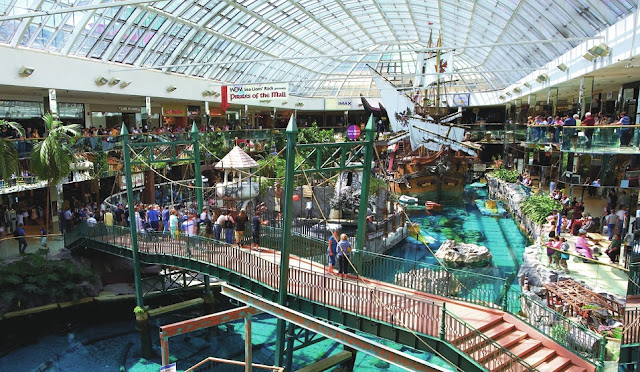The economic boom in Asia is reflected in the development of modern temples of consumerism. Nine out of ten of the world’s biggest shopping malls are located in Asia. Offering much more than “shop till you drop” opportunities – malls are becoming amusement parks and lifestyle centers surrounded by shops.
Emporis.com generated the Top 10 rankings, which are based on the gross leasable area, the area used for revenue-generating activities. Historically, malls have always been the icons of America – the first mall ever was built in Minneapolis in 1956.
However, Asia’s economic boom has resulted in the rise of consumerism and the development of mega-malls. Nowadays, Asia has more malls than America, and the two largest are located in China.
The dimensions of the malls is demonstrated in this comparison: the second biggest mall, Golden Resources Mall, has an area of 557.419 m², the size of about 75 soccer fields.
But some mega-malls in Asia are experiencing problems. New South China Mall is the biggest mall in the world with 600.153 m² of shopping space – most of it empty, with little consumer traffic and a high vacancy rate. It has been classified as a “dead mall”.
In recent years, developers have invented new ways for the mega-mall to survive in this economy. Gone is the store-dominated shopping centre welcoming instead, an age of mixed-use “lifestyle centers”. The Dubai Mall offers an ice-rink and aquarium on an area of 350.244 m². The Persian Gulf Complex, once completed, will house an indoor amusement park, prayer room, and helipad.
Another strategy calls for ways to combine environmental solutions with architecture. An indoor rainforest with koi ponds and the largest rooftop garden in Southeast Asia was implemented by 1 Utama mall in Malaysia. CentralWorld in Thailand features an indoor salt-water lake with sea lions. Trends to include office and residential space, such as the Cehavir Mall in Turkey, are also a survival method of mega-malls. BD+C
CLICK THE LINK BELOW TO VIEW THE TOP 10 LIST
Related Stories
| Aug 11, 2010
Wisconsin becomes the first state to require BIM on public projects
As of July 1, the Wisconsin Division of State Facilities will require all state projects with a total budget of $5 million or more and all new construction with a budget of $2.5 million or more to have their designs begin with a Building Information Model. The new guidelines and standards require A/E services in a design-bid-build project delivery format to use BIM and 3D software from initial ...
| Aug 11, 2010
Opening night close for Kent State performing arts center
The curtain opens on the Tuscarawas Performing Arts Center at Kent State University in early 2010, giving the New Philadelphia, Ohio, school a 1,100-seat multipurpose theater. The team of Legat & Kingscott of Columbus, Ohio, and Schorr Architects of Dublin, Ohio, designed the 50,000-sf facility with a curving metal and glass façade to create a sense of movement and activity.
| Aug 11, 2010
Residence hall designed specifically for freshman
Hardin Construction Company's Austin, Texas, office is serving as GC for the $50 million freshman housing complex at the University of Houston. Designed by HADP Architecture, Austin, the seven-story, 300,000-sf facility will be located on the university's central campus and have 1,172 beds, residential advisor offices, a social lounge, a computer lab, multipurpose rooms, a fitness center, and a...
| Aug 11, 2010
News Briefs: GBCI begins testing for new LEED professional credentials... Architects rank durability over 'green' in product attributes... ABI falls slightly in April, but shows market improvement
News Briefs: GBCI begins testing for new LEED professional credentials... Architects rank durability over 'green' in product attributes... ABI falls slightly in April, but shows market improvement
| Aug 11, 2010
Luxury Hotel required faceted design
Goettsch Partners, Chicago, designed a new five-star, 214-room hotel for the King Abdullah Financial District (KAFD) in Riyadh, Saudi Arabia. The design-build project, with Saudi Oger Ltd. as contractor and Rayadah Investment Co. as developer, has a three-story podium supporting a 17-story glass tower with a nine-story opening that allows light to penetrate the mass of the building.
| Aug 11, 2010
Three Schools checking into L.A.'s Ambassador Hotel site
Pasadena-based Gonzalez Goodale Architects is designing three new schools for Los Angeles Unified School District's Central Wilshire District. The $400 million campus, located on the site of the former Ambassador Hotel, will house a K-5 elementary school, a middle school, a high school, a shared recreation facility (including soccer field, 25-meter swimming pool, two gymnasiums), and a new publ...
| Aug 11, 2010
New Jersey's high-tech landscaping facility
Designed to enhance the use of science and technology in Bergen County Special Services' landscaping programs, the new single-story facility at the technical school's Paramus campus will have 7,950 sf of classroom space, a 1,000-sf greenhouse (able to replicate different environments, such as rainforest, desert, forest, and tundra), and 5,000 sf of outside landscaping and gardening space.
| Aug 11, 2010
U.S. firm designing massive Taiwan project
MulvannyG2 Architecture is designing one of Taipei, Taiwan's largest urban redevelopment projects. The Bellevue, Wash., firm is working with developer The Global Team Group to create Aquapearl, a mixed-use complex that's part of the Taipei government's "Good Looking Taipei 2010" initiative to spur redevelopment of the city's Songjian District.







